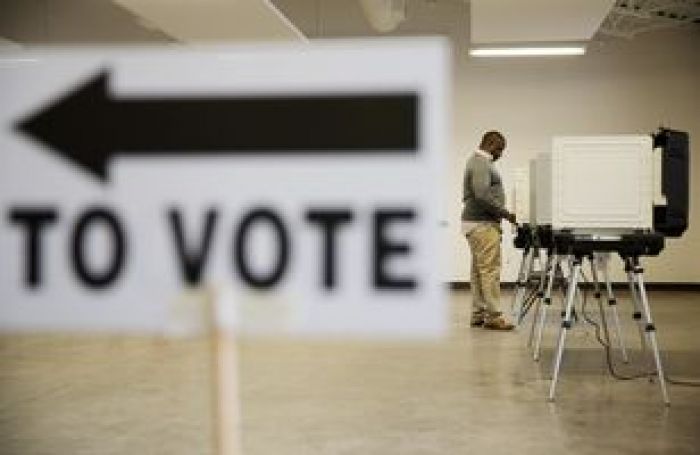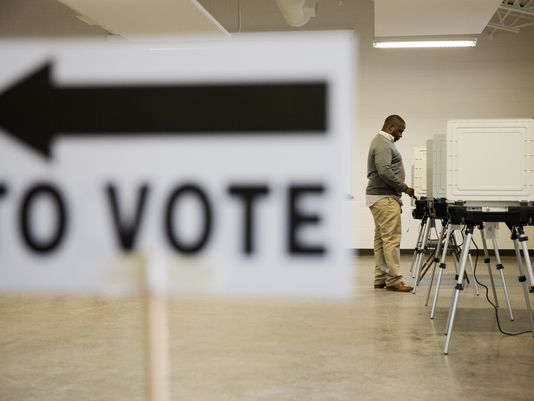Investors eye Trump card's election impact


A voter casts his a ballot in Georgia's primary election at a polling site Tuesday, March 1, 2016, in Atlanta. (AP Photo/David Goldman)(Photo: David Goldman, AP)
The presidential election is eight months away but “political risk” is already being felt on Wall Street, as money and politics collide in a flurry of often “polarizing and populist” campaign sound bites that investors fear could weigh on the economy, financial markets and global trade.
“Is political risk on the rise? Yes," says Mark Luschini, chief investment strategist at Janney Montgomery Scott: “The polarizing, populist rhetoric pointing at select industries, trade and tax policy is an influencing factor in the market’s volatility.”
Wall Street loves certainty. But the 2016 race for the White House is all about uncertainty with no shortage of unknowns and potential plot twists.
Indeed, handicapping this year's circus-like presidential race and its impact on markets has become increasingly difficult.
One wildcard is Donald Trump, the real estate investor best known for his stint on the reality TV show, The Apprentice, who has climbed to the top spot in the Republican race despite wobbly support from his own party and withering criticism Thursday from 2012 GOP candidate Mitt Romney.
Trump’s rise “magnifies the uncertainty,” Luschini says, due in large part to Trump’s anti-establishment, unpredictable, “unconventional … and unscripted” campaign.
While Trump’s plan to lower tax rates for individuals, investors and corporations is viewed as growth-friendly, many of Trump’s other campaign comments are "protectionist" in nature, which worries free trade advocates, Wall Street pros say. Trump says he will build a wall along the U.S. border with Mexico to impede illegal immigration. He branded China a “currency manipulator." And he's issued unkind words about U.S. companies that set up shop overseas to reduce their tax bills or gain other competitive advantages.
“He’s perceived as a populist and nationalist who will reverse the course of globalization,” says Nick Sargen, senior investment advisor at Fort Washington Investment Advisors. “The possibility of a Trump presidency could cause a stir abroad and possible selling of U.S. securities.”
Trump's rhetoric and policies could also cause a “trade war,” which is “bad for the economy,” says Axel Merk of the Merk Funds.
Democratic frontrunner and establishment candidate Hillary Clinton also gives some Wall Streeters pause.
Clinton has been a vocal critic of the pharmaceutical industry for charging exorbitant prices for prescription drugs, raising fears of drug-price controls. The former First Lady and U.S. secretary of state is also a proponent of making the banking sector less risky, and has proposed levying a “risk fee” on banks, imposing a tax on high-frequency trading firms and holding financial employees and executives accountable when they break the law, according to her campaign website.
“Hillary’s reputation precedes her, so I would expect a sell-off in health care and financial stocks should she win,” Sargen says.
Clinton, however, is less of a wildcard than Democratic challenger Bernie Sanders, says Michael Farr, president of money-management firm Farr, Miller & Washington.
“Although Hillary is not generally embraced by Wall Street, she is a known quantity,” says Farr.
This year’s presidential campaign is a choice between “establishment” candidates and “anti-establishment” hopefuls, says Erik Davidson, chief investment officer at Wells Fargo Private Bank.
“The establishment candidates represent some level of certainty,” he says. “At least you know what you will be getting. The notable rise of anti-establishment candidates creates some element of uncertainty as investors don’t really know what they will get.”
Adam Shell on Twitter: @adamshell[1].
Read or Share this story: http://usat.ly/1oSNH95
References
- ^ @adamshell (twitter.com)









